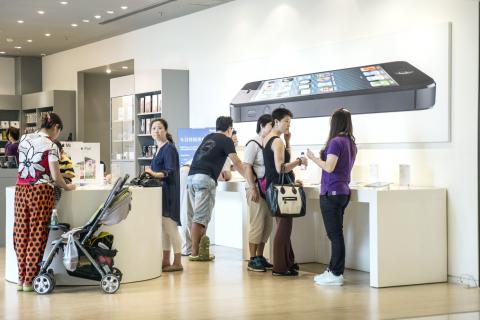Apple Inc is on the verge of clinching agreements with two of the biggest holdouts to selling its iPhone, China Mobile Ltd (中國移動) and NTT DoCoMo Inc, opening a route to hundreds of millions of new customers.
Ahead of an event on Sept. 10 to unveil new iPhones, Apple and China Mobile are near a deal for the world’s largest wireless carrier to offer the device, said a source, who asked not to be identified citing privacy concerns.
Apple is also close to an agreement to distribute its handset through Japan’s largest mobile carrier, NTT DoCoMo, sources have said.

Photo: EPA
Any final deals will bust loose at least 800 million new consumers for the iPhone, with China Mobile boasting 740 million subscribers and NTT DoCoMo about 62 million, data released by the carriers show. Those would be welcome customers for Apple, which is combating slowing sales growth for its flagship product amid competition from Samsung Electronics Co and makers of cheaper handsets.
“This is a very big deal for Apple,” said Brian Marshall, an analyst with ISI Group in San Francisco. “Apple’s iPhone growth has really slowed down.”
The agreements would end years of negotiations where the carriers balked at Apple’s terms, including the costs of subsidies needed to make the iPhone affordable for customers. Apple is set to reveal a lower-cost iPhone on Sept. 10, a source said.
Trudy Muller, a spokeswoman for Apple in Cupertino, California, declined to comment on China Mobile on Friday. Zhang Xuan (張軒), a Beijing-based spokesman for China Mobile’s parent company China Mobile Communications, did not answer calls.
“We’re not the source of information and nothing has been decided at this point,” DoCOMo said on Friday.
While Apple is preparing to a ship a lower-cost iPhone to China Mobile, a deal will not be announced at Apple’s Sept. 10 event, or at a follow-up event in Beijing on Sept. 11, a source said. It is unclear if a DoCoMo agreement will be announced on Sept. 10.
China is one of Apple’s largest markets, yet sales there fell 14 percent last quarter as new local smartphone vendors like ZTE Corp (中興) and Xiaomi Corp (小米) took market share by offering lower-cost alternatives to the iPhone.
China is playing an increasingly important role in the global smartphone market, with sales there exceeding combined US and Western Europe sales, said Linda Sui, an analyst with Strategy Analytics.
In the December quarter, China Mobile may order 5 million iPhones, then 40 million more next year, according to Marshall.

TAKING STOCK: A Taiwanese cookware firm in Vietnam urged customers to assess inventory or place orders early so shipments can reach the US while tariffs are paused Taiwanese businesses in Vietnam are exploring alternatives after the White House imposed a 46 percent import duty on Vietnamese goods, following US President Donald Trump’s announcement of “reciprocal” tariffs on the US’ trading partners. Lo Shih-liang (羅世良), chairman of Brico Industry Co (裕茂工業), a Taiwanese company that manufactures cast iron cookware and stove components in Vietnam, said that more than 40 percent of his business was tied to the US market, describing the constant US policy shifts as an emotional roller coaster. “I work during the day and stay up all night watching the news. I’ve been following US news until 3am

Six years ago, LVMH’s billionaire CEO Bernard Arnault and US President Donald Trump cut the blue ribbon on a factory in rural Texas that would make designer handbags for Louis Vuitton, one of the world’s best-known luxury brands. However, since the high-profile opening, the factory has faced a host of problems limiting production, 11 former Louis Vuitton employees said. The site has consistently ranked among the worst-performing for Louis Vuitton globally, “significantly” underperforming other facilities, said three former Louis Vuitton workers and a senior industry source, who cited internal rankings shared with staff. The plant’s problems — which have not

TARIFF CONCERNS: The chipmaker cited global uncertainty from US tariffs and a weakening economic outlook, but said its Singapore expansion remains on track Vanguard International Semiconductor Corp (世界先進), a foundry service provider specializing in producing power management and display driver chips, yesterday withdrew its full-year revenue projection of moderate growth for this year, as escalating US tariff tensions raised uncertainty and concern about a potential economic recession. The Hsinchu-based chipmaker in February said revenues this year would grow mildly from last year based on improving supply chain inventory levels and market demand. At the time, it also anticipated gradual quarter revenue growth. However, the US’ sweeping tariff policy has upended the industry’s supply chains and weakened economic prospects for the world economy, it said. “Now

UNCERTAINTY: Innolux activated a stringent supply chain management mechanism, as it did during the COVID-19 pandemic, to ensure optimal inventory levels for customers Flat-panel display makers AUO Corp (友達) and Innolux Corp (群創) yesterday said that about 12 to 20 percent of their display business is at risk of potential US tariffs and that they would relocate production or shipment destinations to mitigate the levies’ effects. US tariffs would have a direct impact of US$200 million on AUO’s revenue, company chairman Paul Peng (彭雙浪) told reporters on the sidelines of the Touch Taiwan trade show in Taipei yesterday. That would make up about 12 percent of the company’s overall revenue. To cope with the tariff uncertainty, AUO plans to allocate its production to manufacturing facilities in